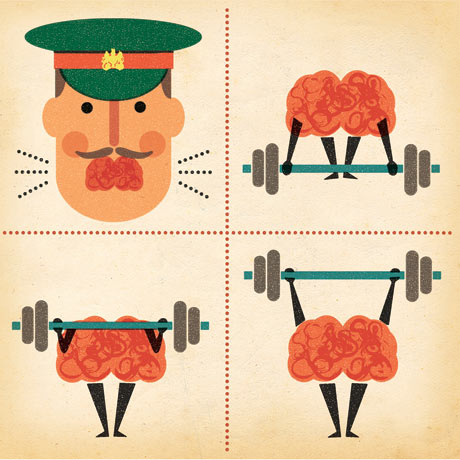
In December 1917, an advertisement appeared in Nash's Pall Mall Magazine, posing a question that, nearly a century on, makes no sense: "Do you Pelmanize?" It wouldn't have baffled the magazine's readers, though: by 1917, thanks to hundreds of similar ads, the mind-training system of Pelmanism was big business in Britain; the Pelman Institute boasted addresses in India, Australia and the US. Suffering from "brain fag", "indefiniteness" or "want of energy"? Pelmanism, delivered by correspondence course, promised to help. Its origins were murky, but the man behind the ads, William Ennever, knew how to build a brand. He was soon claiming endorsements from Robert Baden-Powell, Herbert Asquith and Baroness Orczy. "If it were within my power," wrote one George Henry in 1718, "I would so order it that every... discharged soldier [receive] a free enrollment for a course of Pelmanism." Intrigued? This column's old friend, get-rich-quick merchant "Dr" Joe Vitale, will sell you "these 12 long-lost astonishing books" for just $19! Which sounds tempting, until you realise they're free via sector51.com.
Appropriately for a system backed by Baden-Powell, the voice of the Pelman pamphlets is that of a lieutenant-general, fond of cold showers and the colonial pronunciation of the word Kenya. There's some marvellously British advice, such as "Don't poke into your subconscious" and "Don't monkey with hypnotism", yet what's most striking is how much of it prefigures more recent research. There's little of the positive thinking flourishing at the time in America. Instead, Pelmanism involves memory games and attention-training techniques. Some resemble what present-day practitioners call mindfulness; others embody the currently popular idea of willpower as a trainable muscle. "Take up a position inside the house or outside," the student is advised, and write down all the sense-data you notice: sights, sounds, smells. There are stretching routines, combined with breath awareness – suddenly, the lieutenant-general has become a yoga teacher. There are useful life-auditing questions, which Pelmanism calls a "self-drill": "How long is it since you did something really kind and generous?" "Have you discovered what, for yourself, is the best hour for calm reflection?" Underlying it all is a focus on effort. "No sane person expects to develop muscle by reading a book; he knows he must practise... Similarly, the Pelmanist knows he must practise mental exercise." There isn't one secret to mental effectiveness, the pamphlets say. There are many – and you'll need to work at them.
Which is, I suspect, why Pelmanism is forgotten now. (You may recall a card game of the same name, based vaguely on its ideas.) We crave not only quick fixes but unitary ones: the "one thing that will change everything". Yet, as a contributor to the online magazine Elephant Journal puts it, on the topic of depression, there's usually more value in a "5% solution": 20 smaller things, done little and often. Pelmanism lacked a One Thing; it relied instead on relentless advertising, which couldn't be sustained forever. By 1940, Ennever was bankrupt and touting a dodgy-sounding new organisation called The Personology Institute. He died in 1947, and Pelmanism's slide into permanent obscurity began. Which is a pity, because last time I checked, "brain fag" and "want of energy" haven't gone anywhere. Perhaps we need to start Pelmanizing again?
oliver.burkeman@theguardian.com Follow Oliver on Twitter.

